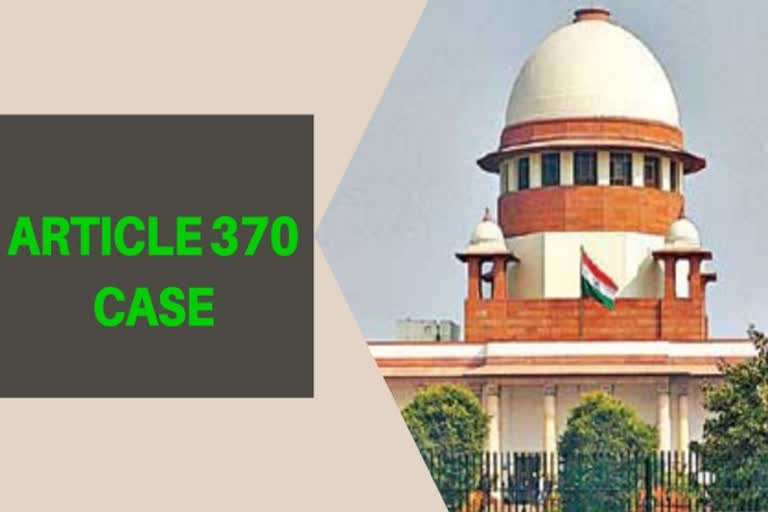নতুন দিল্লীঃ ভাৰতৰ উচ্চতম ন্যায়ালয়ে সংবিধানিক বিচাৰপিঠলৈ প্ৰেৰণ কৰাৰ সম্ভাৱনা আছে অনুচ্ছেদ 370 প্ৰত্যাহাৰৰ গোচৰ ৷ বিভিন্ন জনে প্ৰেৰণ কৰা য়াচিকা আৰ্জি সমূহ চোৱাৰ পিছত মঙলবাৰে এই কথা সদৰী কৰে ভাৰতৰ সৰ্বোচ্চ ন্যায়ালটোৱে ৷
উক্ত অনুচ্ছেদে কাশ্মীৰক প্ৰদান কৰি আহিছিল বিশেষ মৰ্যদা ৷ জেষ্ঠ অধিবক্তা দীনেশ দৌবিদিয়ে প্ৰেম শংকৰ ঝাক প্ৰতিনিধিত্ব কৰি 1959 ৰ প্ৰেম নাথ কৌল বনাম জে এণ্ড কে ৰ বিষয়ৰ বিচাৰত শীৰ্ষ আদালতৰ পাঁচ জনীয়া সংবিধান বিছাৰপিঠৰ পৰস্পৰ বিৰোধী নিৰ্ণয়ৰ দিশে আঙুলীয়াই ৷ তেও বিষয়টো নিষ্পত্তিৰ বাবে সাতজনীয়া সংবিধানিক বিচাৰ পীঠলৈ গোচৰটো প্ৰেৰণ কৰাৰ দাবী কৰে ৷
জেষ্ঠ অধিবক্তা ৰাজিব ধাৱনে কয় যে, 5 আগষ্টত কেন্দ্ৰৰ 370 প্ৰত্যাহাৰৰ সিদ্ধান্ত পত্যাহ্বান বৃহৎ পীঠৰ সৈতে জৰিত ৷
2021 বৰ্ষৰ 21 জানুৱাৰীৰ পৰা এই বিষয়টো সম্পৰ্কে আৰম্ভ হ'ব শুনাণি ৷
Intro:Body:
New Delhi, Dec 12 (IANS) The Supreme Court on Thursday said it might examine referring the challenges to the revocation of provisions of Article 370 from the five-judge Bench to a seven-judge Bench after looking into the preliminary submissions of all the petitioners.
The article gave special status to the erstwhile state of J&K. The court's observation came after counsels cited two conflicting judgments by the five-judge Bench of the top court in 1959 and 1970.
Senior advocate Dinesh Dwivedi, representing Prem Shankar Jha, pointed to the two conflicting judgments by the five-judge Bench of the apex court in 1959 in the Prem Nath Kaul versus J&K case and in 1970 in the Sampat Prakash versus J&K case.
He sought referring of the matter to the larger seven-judge Bench for definite findings.
He had raised the issue on the first day of the hearing by a five-judge Constitution Bench, headed by Justice N.V. Ramana and comprising Justices Sanjay Kishan Kaul, R. Subhash Reddy, B.R. Gavai and Surya Kant.
Senior advocate Rajeev Dhavan said the court could hear the parties challenging the modifications to Article 370 through the Centre's decision on August 5 and then examine the issue connected with larger Bench.
Senior advocate Raju Ramachandaran, appearing for former bureaucrat Shah Faesal and Shehla Rashid, resumed his arguments and said the state of J&K through a democratic process could decide on the methodology to exercise its constituent powers in accordance with its Constitution.
The state could also decide on the process of succession to the Constituent Assembly, that's who would have constituent powers to take decisions in future, Ramachandaran said.
The hearing will continue on January 21.
Conclusion:



